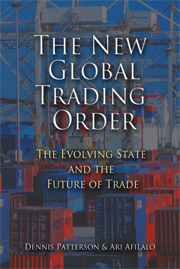Book contents
- Frontmatter
- Contents
- Preface
- 1 Introduction
- 2 The Evolving State
- 3 The Changing Nature of Welfare
- 4 Disaster and Redemption: 1930s and Bretton Woods
- 5 The Transformation of the Bretton Woods World and the Rise of a New Economic Order
- 6 The End of Bretton Woods and the Beginning of a New Global Trading Order
- 7 The Enablement of Global Economic Opportunity
- 8 Trade and Security
- Conclusion
- Notes
- Bibliography
- Index
Conclusion
Published online by Cambridge University Press: 02 July 2009
- Frontmatter
- Contents
- Preface
- 1 Introduction
- 2 The Evolving State
- 3 The Changing Nature of Welfare
- 4 Disaster and Redemption: 1930s and Bretton Woods
- 5 The Transformation of the Bretton Woods World and the Rise of a New Economic Order
- 6 The End of Bretton Woods and the Beginning of a New Global Trading Order
- 7 The Enablement of Global Economic Opportunity
- 8 Trade and Security
- Conclusion
- Notes
- Bibliography
- Index
Summary
We live in an era of transition and transformation. The collapse of the Berlin Wall and the end of the Long War did not end history. Rather, the lull in foundational changes that followed the resolution of the great ideological battle of the twentieth century proved to be no more than a pause in the historical narrative. The victors of the war now face new, globalized, and diffuse chronic problems that threaten their continued ability to function as prosperous, liberal democratic states. Terrorist networks dedicated to suicide operations, the conflicts between the West and radical Islamic forces, and the volatile state of key geopolitical allies such as Pakistan, generate risks of protracted and diffuse military conflicts. Environmental and health threats are of a magnitude that make it impossible for any single state, however powerful, to control the outcome of threats that affect the collectivity. Global warming, viruses that can spread on the same schedule as a major airline's daily routes, staggering rates of infectious diseases in many poor countries, and myriad other health or environmental concerns, endanger virtually every inhabitant of the planet.
Markets, enterprises, and economic activities are also intertwined, spanning a mass that is best understood as a global market, where pre-modern, modern, and post-modern population segments live side-by-side. Private economic interests, networks of government officials, associations of professionals, coalitions of consumers, and other interests have enormous influence over issues that, in the modern era, would have fallen squarely within the competence of the State.
- Type
- Chapter
- Information
- The New Global Trading OrderThe Evolving State and the Future of Trade, pp. 203 - 208Publisher: Cambridge University PressPrint publication year: 2008



